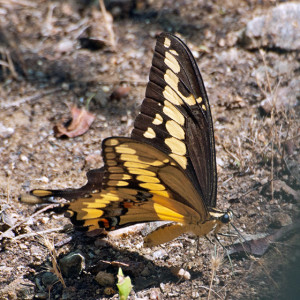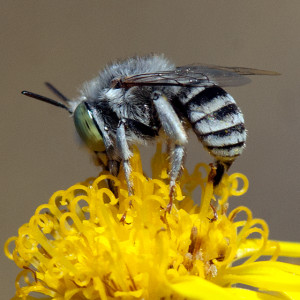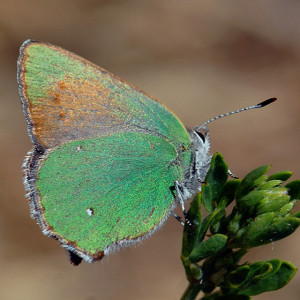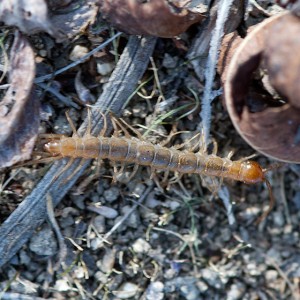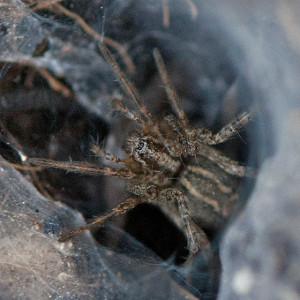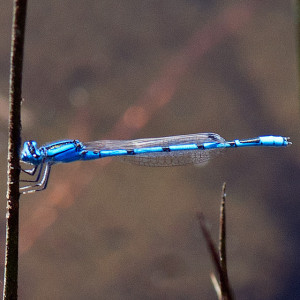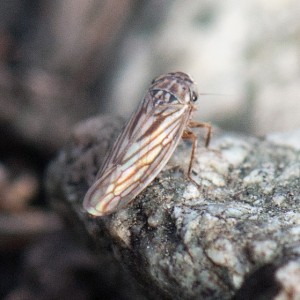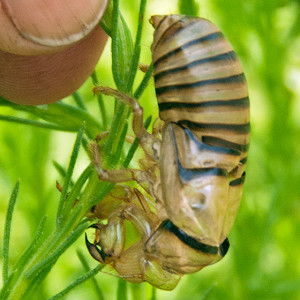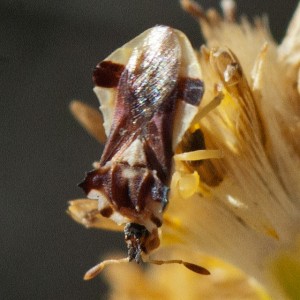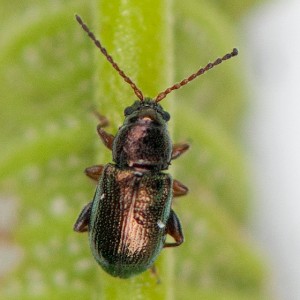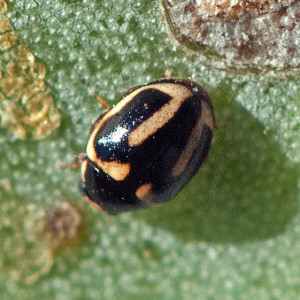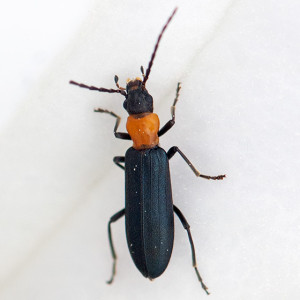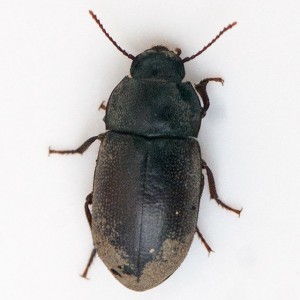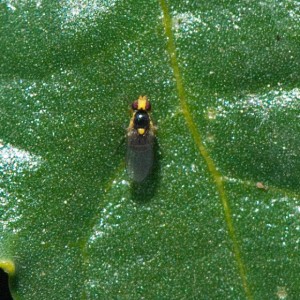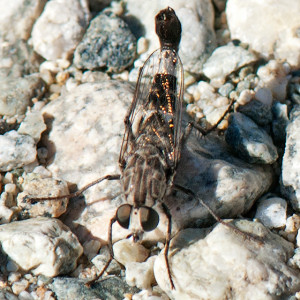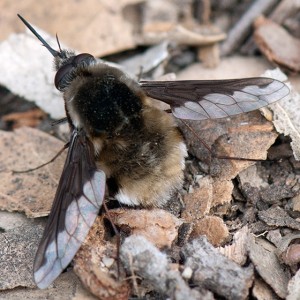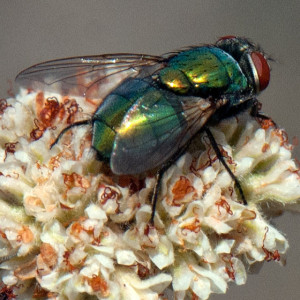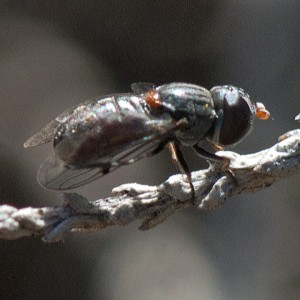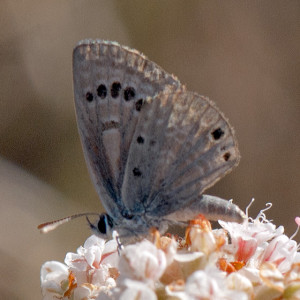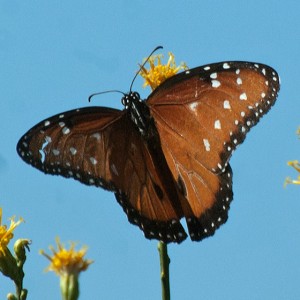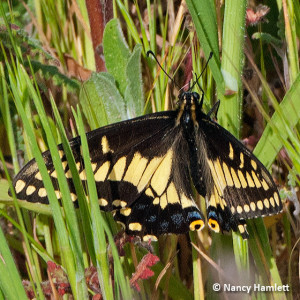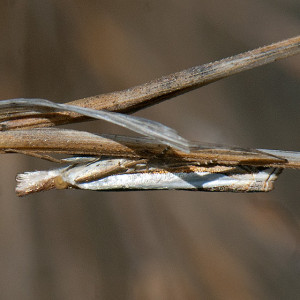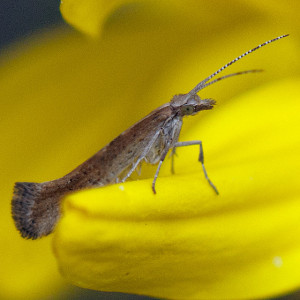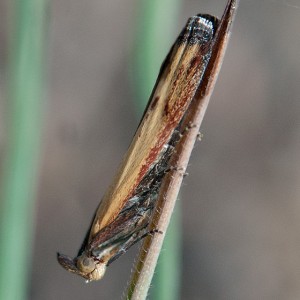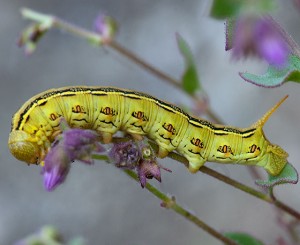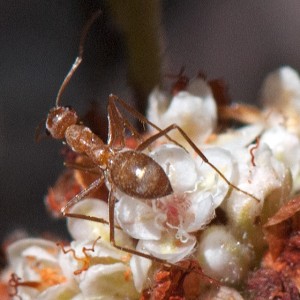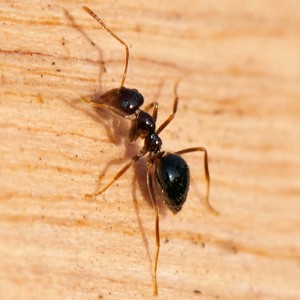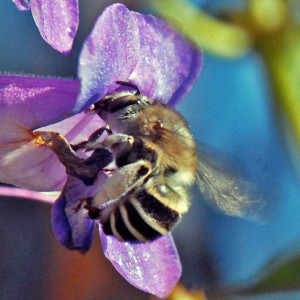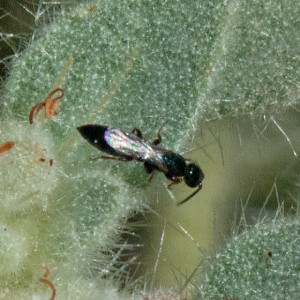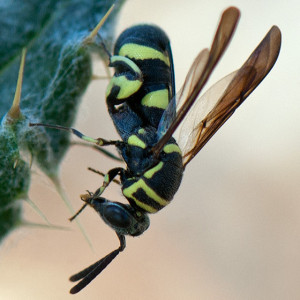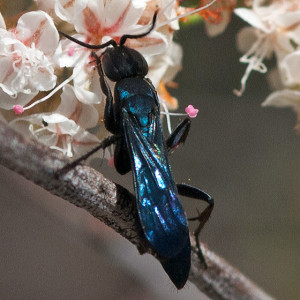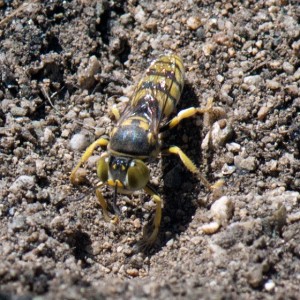The BFS invert list has just undergone a major update! Since Summer 2009, when we posted our first draft of the BFS Invertebrate List with 169 taxa, we have periodically been adding to the list, and this addition is big! Since our last update, we have added 170 new taxa – more than on the original list, bringing the total on the list to more than 600. The new taxa include 1 slug, 1 centipede, 1 millipede, 53 spiders, 1 mite, 1 damselfly, 1 dragonfly, 1 earwig, 13 bugs, 1 antlion, 12 beetles, 23 flies, 8 butterflies, 15 moths, 17 ants, 11 bees, 10 wasps, and 32 new invertebrate families! A complete list of the new taxa is at the end of this post.
Some families were known to be at the BFS (e.g., House Flies, Mosquitos!), but none had been officially recorded on the list. Some of the taxa had also been previously observed but not identified to species (e.g., Centris pallida and Anthophora californica).
The taxa that are represent new observations come from a variety of source, including pitfall traps, sweep-netting, regular visual/photographic insect surveys, and casual observations. (See ‘Acknowledgements’ below for details.)
A few name changes:
Besides the new additions, the list also reflects a few recent name changes:
- Papilio rumiko – Western Giant Swallowtail (previously listed as Papilio cresphontes Giant Swallowtail
The butterflies that had been called Papilio cresphontes (Giant Swallowtail) have actually been found to belong to two species (Shiraiwa et al. 2014). The species found in the eastern US remains P. cresphontes, and the western species is now called P. rumiko. The two species overlap only in Texas. - Anthophora curta (previously listed as A. squammulosa)
A. curta had been considered conspecific with A. squammulosa, but Orr et al. (2014) showed that the two are clearly differentiated by both morphological characters and geographic distribution. On both counts, ours are clearly A. curta. - Callophrys dumetorum – Lotus Hairstreak (previously listed as C. affinis – Western Green Hairstreak)
In 2012, the International Commission on Zoological Nomenclature issued an opinion that green hairstreaks previously listed as C. perplexa (which is what we should have been calling ours) are now called C. dumetorum. The more northern coastal green hairstreaks previously called C. dumetorum are now C. viridis. Our BFS species had been confirmed as C. dumetorum.
Acknowledgments:
A lot of folks contributed to this update! BFS Director Marty Meyer’s research group, including Pomona students Weston Staubus, Dakota Spear, Tessa Adams, Elise Boyd, Clayton Ziemke Madison Dipman, and Ashish Streatfield collected and identified spiders and ants collected in pitfall traps placed in various BFS habitats. Brandon Watts from Cal Poly Pomona (advisor Joan Leong) collected insects by sweep-netting. The San Gabriel Valley Mosquito & Vector Control District shared their mosquito sightings from the BFS. Jonathan Wright, Hartmut Wisch, Nancy Hamlett, Ben Stapp, and Richard Rojo shared observations, photographed insects, and collected specimens.
We are also very grateful to the many additional folks who helped with identification, including Kimberly Franklin, University of Arizona; Sandra Brantley, University of New Mexico; Doug Yanega, UC Riverside Entomology Museum; Jim Hogue, Cal State Northridge Biology Department; Molly Rightmyer Gee, San Diego Natural History Museum; Andy Hamilton, Canadian National Collection of Insects, Arachnids and Nematodes; John Ascher, National University of Singapore and American Museum of Natural History; Andy Calderwood, Ventura County Agricultural Commissioner’s Office; David Furguson, Rio Grande Botanic Garden; Ken Davenport, Josiah Gilbert, and Robert Martin at Butterflies and Moths of North America; and all the other folks at BugGuide.
The complete list of new additions:
Here is the complete list of new additions with some photos. Additional photos are available in the BFS Photo Database and are linked to the BFS invert list.
PHYLUM MOLLUSCA
- Class Gastropoda (Slugs & Snails)
- Order Stylommatophora
- Family Milacidae (Terrestrial Slugs)
- Milax gagates (Jet Greenhouse Slug)
- Family Milacidae (Terrestrial Slugs)
- Order Stylommatophora
PHYLUM ARTHROPODA
- Class Chilopoda (Centipedes)
- Order Lithobiomorpha (Stone Centipedes – new order
- Family Lithobiidae – new family
- Lithobius forficatus (a stone centipede)
- Lithobius forficatus (a stone centipede)
- Family Lithobiidae – new family
- Order Lithobiomorpha (Stone Centipedes – new order
- Class Diplopoda (Millipedes)
- Order Spirobolida
- Family Atopetholidae – new family
- Unidentified sp. (a spirobolid millipede)
- Family Atopetholidae – new family
- Order Spirobolida
- Class Arachnida (Spiders, scorpions, mites, & their relatives)
- Order Araneae (Spiders)
- Family Agelenidae (Funnel Weavers)
- Ageleninae, unidentified sp. (a funnel web spider)
- Calilena restricta (a funnel web spider)
- Tegenaria pagana (a funnel web spider)
- Ageleninae, unidentified sp. (a funnel web spider)
- Family Amaurobiidae (Hacklemesh Weavers) – new family
- Amaurobius latescens (a hacklemesh weaver)
- Family Araneidae (Orb Weavers)
- Neoscona oaxacensis (Western Spotted Orbweaver)
- Family Corinnidae (Antmimics and Ground Sac Spiders) – new family
- Meriola californica
- Phrurotimpus mateonus
- Family Cyrtaucheniidae (Wafer Trapdoor Spiders) – new family
- Aptostichus atomarius (San Bernardino Hills Trapdoor Spider)
- Family Dictynidae (Mesh Web Weavers) – new family
- Blabomma grandis (a mesh web weaver)
- Cicurina sp. 1 (a mesh web weaver)
- Emblyna olympiana (a mesh web weaver)
- Yorima angelica (a mesh web weaver)
- Family Gnaphosidae (Ground Spiders) – new family
- Callilepsis eremella (a ground spider)
- Callilepsis gosoga (a ground spider)
- Drassodes angulus (a ground spider)
- Drassodes saccatus (a ground spider)
- Drassyllus insularis (a ground spider)
- Drassylus lamprus (a ground spider)
- Drassylus proclesis (a ground spider)
- Gnaphosa californica (a ground spider)
- Haplodrassus maculatus (a ground spider)
- Haplodrassus signifer (a ground spider)
- Micaria deserticola (a ground spider)
- Micaria jeanae (a ground spider)
- Scopoides nesiotes (a ground spider)
- Trachyzelotes barbatus (a ground spider)
- Urozelotes rusticus (a ground spider)
- Zelotes gynethus (a ground spider)
- Zelotes nilicola (a ground spider)
- Family Hahniidae (Dwarf Sheet Spiders) – new family
- Neoantistea agilis (a dwarf sheet spider)
- Family Linyphiidae (Sheetweb and Dwarf Spiders) – new family
- Agyneta sp. (a sheetweb spider)
- Spirembolus praelongus (a dwarf spider)
- Spirembolus sp. 1 (a dwarf spider)
- Wubana drassoides (a sheetweb spider)
- Wubana suprema (a sheetweb spider)
- Family Liocranidae (Liocranid Sac Spiders) – new family
- Apostenus californicus (a liocranid sac spider)
- Family Lycosidae (Wolf Spiders)
- Alopecosa kochi (a wolf spider)
- Schizocosa mccooki (a wolf spider)
- Family Oecobiidae (Wall Spiders) – new family
- Oecobius navus (Wall Spider)
- Family Philodromidae (Running Crab Spiders) – new family
- Titanebo californicus (a running crab spider)
- Family Pholcidae (Cellar Spiders) – new family
- Psilochorus utahensis (a cellar spider)
- Family Phrurolithidae – new family
- Phrurolithus duncani
- Neozimiris sp. 1
- Family Salticidae (Jumping Spiders)
- Anasaitis canosa (Twinflagged Jumping Spider)
- Chalcoscirtus diminutus (a jumping spider)
- Habronattus sp. 1 (a jumping spider)
- Salticidae sp. 2 (a jumping spider)
- Family Tengellidae (Tengellid Spiders) – new family
- Socalchemmis dolichopus (a tengellid spider)
- Family Theridiidae (Cobweb Spiders)
- Asagena fulva (a cobweb spider)
- Enoplognatha marmorata (Marbled Cobweb Spider)
- Theridion californicum (a cobweb spider)
- Family Thomasidae (Crab Spiders)
- Xysticus californicus (a ground crab spider)
- Xysticus montanensis (a ground crab spider)
- Family Agelenidae (Funnel Weavers)
- Subclass Acari (Mites & ticks)
- Family Anystidae – new family
- Paratarsotomus macropalpis (a mite)
- Family Anystidae – new family
- Order Araneae (Spiders)
- Class Insecta (Insects)
- Order Odonata (Dragonflies & damselflies)
- Suborder Zygoptera (Damselflies)
- Enallagma civile (Familiar Bluet)
- Enallagma civile (Familiar Bluet)
- Suborder Anisoptera (Dragonflies)
- Pantala sp (a rainpool glider)
- Suborder Zygoptera (Damselflies)
- Order Dermaptera (Earwigs)
- Family Forficulidae
- Forficula auricularia (European Earwig)
- Family Forficulidae
- Order Hemiptera (True bugs)
- Family Alydidae (Broad-headed Bugs) – new family
- Tollius sp. (a broad-headed bug)
- Family Cicadellidae (Leafhoppers)
- Euscelis variegatus (a leafhopper)
- Exitianus exitiosus (Gray Lawn Leafhopper)
- Family Cicadidae (Cicadas)
- Okanagana sp. (a cicada)
- Okanagana sp. (a cicada)
- Family Clastopteridae (Spittlebugs) – new family
- Clastoptera sp. (a spittlebug)
- Family Coreidae (Leaffooted Bugs)
- Catorhintha apicalis (a leaffooted bug)
- Family Geocoridae (Big-eyed Bugs) – new family
- Geocoris sp. (Big-eyed Bug)
- Family Lygaeidae (Seed Bugs)
- Melanopleurus belfragei (Redcoat Seed Bug)
- Family Pentatomidae (Stink Bugs)
- Chlorochroa sayi (Say’s Stink Bug)
- Thyanta custator (Red-shouldered Stink Bug)
- Family Reduviidae (Assassin Bugs)
- Phymata pacifica (Pacific Ambush Bug)
- Zelus tetracanthus (Four Spurred Assassin Bug)
- Phymata pacifica (Pacific Ambush Bug)
- Family Rhopalidae (Scentless Plant Bugs)
- Liorhyssus hyalinus (a scentless plant bug)
- Family Alydidae (Broad-headed Bugs) – new family
- Order Neuroptera (Antlions, Lacewings, and Allies)
- Family Myrmeleontidae (Antlions)
- Unidentified antlion (not Brachynemurus)
- Family Myrmeleontidae (Antlions)
- Order Coleoptera (Beetles)
- Family Chrysomelidae (Leaf Beetles)
- Hemiglyptus basalis (a leaf beetle)
- Lema daturaphila (Three-lined Potato Beetle)
- Hemiglyptus basalis (a leaf beetle)
- Family Coccinellidae (Lady Beetles)
- Hyperaspis trifurcata (Trident Lady Beetle)
- Hyperaspis trifurcata (Trident Lady Beetle)
- Family Carabidae (Ground Beetles)
- Calosoma semilaeve (Black Calosoma)
- Family Dascillidae (Soft-bodied Plant Beetles)
- Anorus piceus (a soft-bodied plant beetle)
- Family Melyridae (Soft-winged Flower Beetles)
- Tanaops sp. (a soft-winged flower beetle)
- Family Mycetophagidae (Hairy Fungus Beetles) – new family
- Unidentified sp., possibly Litargus (a hairy fungus beetle)
- Family Nitidulidae (Sap-feeding Beetles) – new family
- Nitops pallipennis (a sap-feeding beetle)
- Family Oedemeridae (False Blister Beetles) – new family
- Asclera excavata (a false blister beetle)
- Asclera excavata (a false blister beetle)
- Family Staphylinidae (Rove Beetles) – new family
- Subfamily Aleocharinae (a rove beetle)
- Family Tenebrionidae (Darkling Beetles)
- Metoponium sp. (a darkling beetle)
- Metoponium sp. (a darkling beetle)
- Family Chrysomelidae (Leaf Beetles)
- Order Diptera (Flies)
- Family Agromyzidae (Leaf Miner Flies) – new family
- Liriomyza sp. (likely L. sativae or L. trifolii) (a leaf miner fly)
- Liriomyza sp. (likely L. sativae or L. trifolii) (a leaf miner fly)
- Family Apioceridae (Flower-loving Flies) – new family
- Apiocera sp. (a flower-loving fly)
- Apiocera sp. (a flower-loving fly)
- Family Asilidae (Robber Flies)
- Cophura sp. (ID tentative) (a robber fly)
- Efferia albibarbis (a robber fly)
- Family Bombyliidae (Bee Flies)
- Aphoebantus interruptus (a bee fly)
- Bombylius major (Greater Bee Fly)
- Poecilognathus sp. (a bee fly)
- Family Calliphoridae (Blow Flies)
- Lucilia sp. (a blow fly)
- Chrysomya megacephala (a hairy maggot blow fly)
- Lucilia sp. (a blow fly)
- Family Chironomidae (Midges)
- Subfamily Tanypodinae (a midge)
- Family Chloropidae (Frit Flies) – new family
- Unidentified sp. (a frit fly)
- Family Culicidae (Mosquitoes) – new family
- Anopheles freeborni (Western Malaria Mosquito) (ID probable, need to examine with microscope)
- Culex erythrothorax (Tule Mosquito)
- Culex quinquefasciatus (Southern House Mosquito)
- Ochlerotatus sierrensis (Western Treehole Mosquito)
- Family Milichiidae (Freeloader Flies) – new family
- Unidentified black freeloader fly
- Family Muscidae (House Flies and kin) – new family
- Unidentified aquatic species
- Family Stratiomyidae (Soldier Flies)
- Hermetia sp. (a soldier fly)
- Family Syrphidae (Hover Flies)
- Nausigaster unimaculata (a hover fly)
- Nausigaster unimaculata (a hover fly)
- Family Tachinidae (Tachinid Flies)
- Gymnosoma sp. (a tachinid fly)
- Family Tephritidae (Fruit Flies)
- Ceratitis capitata (Mediterranean Fruit Fly)
- Family Therevidae (Stiletto Flies) – new family
- Nebritus pellucidus (a stiletto fly)
- Family Ulidiidae (Picture-winged Flies)
- Diacrita costalis (a picture-winged fly)
- Family Agromyzidae (Leaf Miner Flies) – new family
- Order Lepidoptera (Butterflies & moths) – Butterflies:
- Family Hesperiidae (Skippers)
- Erynnis propertius (Propertius Duskywing)
- Poanes melane (Umber Skipper)
- Family Lycaenidae (Blues, Coppers, Hairstreaks, Harvesters)
- Celastrina echo echo (Pacific Azure)
- Echinargus isola (Reakirt’s Blue)
- Hemiargus ceraunus (Ceraunus Blue)
- Satyrium auretorum (Gold-hunter’s Hairstreak)
- Family Nymphalidae (Brushfooted Butterflies)
- Danaus gilippus (Queen)
- Danaus gilippus (Queen)
- Family Papilionidae (Swallowtails, Parnassians)
- Papilio polyxenes coloro (Desert Black Swallowtail)
- Papilio polyxenes coloro (Desert Black Swallowtail)
- Family Hesperiidae (Skippers)
- Order Lepidoptera (Butterflies & moths) – Moths:
- Family Crambidae (Crambid Snout Moths) – new family
- Agriphila attenuatus (a crambid snout moth)
- Crambus sperryellus (a crambid snout moth)
- Nomophila nearctica (Lucerne Moth)
- Pyrausta laticlavia (Southern Purple Mint Moth)
- Family Erebidae
- Catocala junctura (Joined Underwing)
- Family Geometridae (Geometrid Moths)
- Neoterpes edwardsata (a geometrid moth)
- Plataea californiaria (a geometrid moth)
- Pero macdunnoughi (McDunnough’s Pero)
- Family Noctuidae (Owlet Moths)
- Euxoa auxiliaries (Army Cutworm Moth)
- Spodoptera exigua (Small Mottled Willow Moth)
- Family Plutellidae – new family
- Plutella xylostella (Diamondback Moth)
- Plutella xylostella (Diamondback Moth)
- Family Pyralidae (Pyralid Moths) – new family
- Elasmopalpus lignosellus (Lesser Cornstalk Borer)
- Elasmopalpus lignosellus (Lesser Cornstalk Borer)
- Family Sesiidae (Clearwing Moths)
- Melittia gloriosa (Glorious Squash Vine Borer)
- Synanthedon polygoni (Buckwheat Root Borer)
- Family Sphingidae (Sphinx Moths)
- Hyles lineata (White-lined Sphinx)
- Hyles lineata (White-lined Sphinx)
- Family Crambidae (Crambid Snout Moths) – new family
- Order Hymenoptera (Ants, bees, & wasps) – Ants
- Family Formicidae (Ants)
- Brachymyrmex depilis
- Dorymyrmex insanus
- Forelius mccooki (an odorous ant)
- Messor andrei (a smooth harvester ant)
- Messor chamberlini (a smooth harvester ant)
- Myrmecocystus mimicus (a honeypot ant)
- Myrmecocystus testaceus (a honeypot ant)
- Myrmecocystus wheeleri (a honeypot ant)
- Pheidole cerebrosior (a big-headed ant)
- Pheidole hyatti (a big-headed ant)
- Pheidole pilifera (a big-headed ant)
- Prenolepis imparis (False Honey Ant)
- Solenopsis xyloni Southern Fire Ant
- Stenamma MGB101#
- Stenamma MGB102#
- Temnothorax andrei (an acorn ant)
- Temnothorax nevadensis (an acorn ant)
- Family Formicidae (Ants)
- Order Hymenoptera (Ants, bees, & wasps) – Bees
- Family Andrenidae (Mining Bees)
- Andrena palpalis (a mining bee)
- Perdita rhois (a mining bee)
- Family Apidae (Cuckoo, Carpenter, Digger, Bumble, & Honey Bees)
- Anthophora californica (California Anthophora)
- Centris pallida (Pallid Bee)
- Diadasia bituberculata (a chimney bee)
- Melissodes sp. (a long-horned bee)
- Melissodes (Melissodes) sp. (a long-horned bee)
- Melecta separata callura (a cuckoo bee)
- Family Halictidae (Sweat Bees)
- Halictus ligatus (a sweat bee)
- Halictus tripartitus (a sweat bee)
- Family Megachilidae (Mining Bees)
- Chelostoma (Subgenus Foveosmia) (an osmiine bee)
- Family Andrenidae (Mining Bees)
- Order Hymenoptera (Ants, bees, & wasps) – Wasps
- Family Bethylidae – new family
- Goniozus sp. (a parasitic wasp)
- Goniozus sp. (a parasitic wasp)
- Family Crabronidae (Bee Wolves & Sand Wasps)
- Subtribe Crabronina (a square-headed wasp)
- Subtribe Gorytina (a sand wasp)
- Subtribe Gastrosericina (a square-headed wasp)
- Family Ichneumonidae (Ichneumon Wasps)
- Subfamily Ophioninae (an ichneumon wasp)
- Family Leucospidae (Leucospid Wasps) – new family
- Leucospis affinis (a leucospid wasp)
- Leucospis affinis (a leucospid wasp)
- Family Pompilidae (Spider Wasps)
- Aporus hirsutus (a spider wasp)
- Tachypompilus unicolor (a spider wasp)
- Aporus hirsutus (a spider wasp)
- Family Sphecidae (Thread-waisted Wasps)
- Tribe Bembcini (Sand Wasps)
- Tribe Bembcini (Sand Wasps)
- Family Bethylidae – new family
- Order Odonata (Dragonflies & damselflies)
References:
- Kojiro Shiraiwa, Qian Cong, Nick V. Grishin. 2014. A new Heraclides swallowtail (Lepidoptera, Papilionidae) from North America is recognized by the pattern on its neck. ZooKeys 468: 85-135.
- M Orr, J Koch, T Griswold, J Pitt. 2014.Taxonomic utility of environmental niche models for species distinction: A case study in Anthophora (Heliophila)(Hymenoptera: Apidae). Zootaxa 3846 (3): 411–429.
- OPINION 2291 (Case 3524) Thecla dumetorum Boisduval, 1852 (currently Callophrys dumetorum), proposed neotype; and Thecla sheridonii Carpenter, 1877 (currently C. sheridanii) (Lepidoptera, LYCAENIDAE): current usage and names conserved. 2012. Bulletin of Zoological Nomenclature 69: 69-71. A summary is available in the News of the Lepidopterists’ Society, Vol. 54, No. 2, Summer 2012, p. 40.
